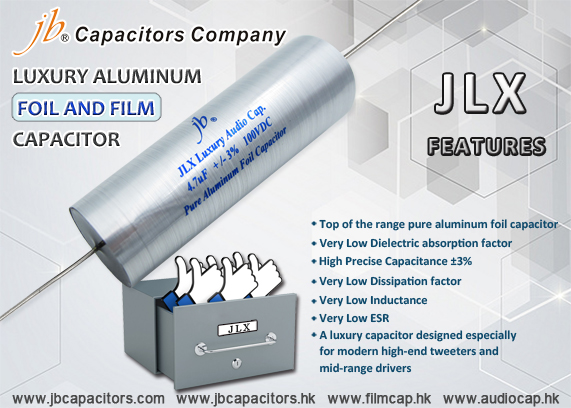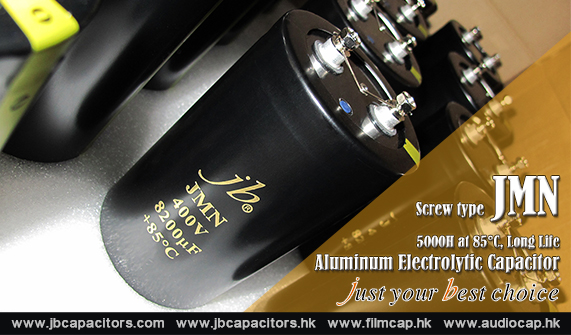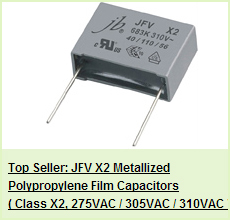2022-12-1 10:12:44
views
Keywords: ISO manufacturer, Film Capacitors
jb Capacitors Company are an ISO manufacturer, we provide our products with competitive price and reliable quality.
Short delivery time, such as 5 to 7 weeks. Some hot items can be ready in 3 weeks.
Our strong capacitors series: Plastic film capacitors, Aluminum radial Ecaps, SMD Aluminum Ecaps, Polymer Aluminum Solid Capacitors, Ceramic Capacitors, Tantalum Capacitors.
We have wide series to be the excellent replacement of Epcos, Panasonic, Samwha, Jamicon, Nichicon, NIPPON CHEMI-CON, Rubycon, Elna, SAMXON, YAGEO etc.
Please contact us with your inquiry!
info@jbcapacitors.com
Attention: FREE SAMPLES are available!
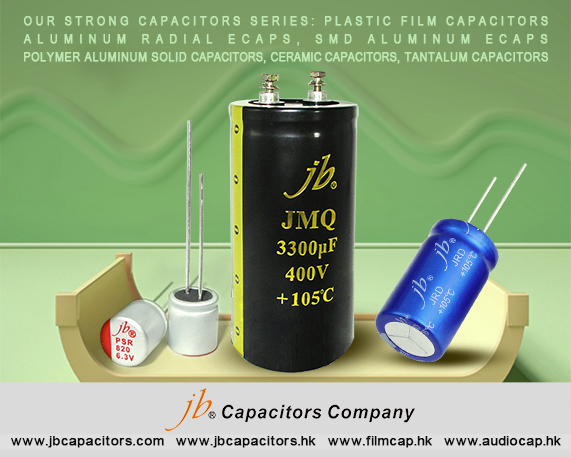
2021-7-14 9:20:33
views
Not long ago, we’ve launched a new series of JGZ–Radial, Snap-in, Screw Type Super Capacitors. To replace rechargeable batteries, super capacitors is one way to satisfy.
For nanotechnology, this offers a new method of storage for energy. Super capacitors can recharge within seconds and withstand virtually unlimited charge cycles.
jb is offering different type of super capacitors, but today, this is about JGZ series. According to different value, it has different type. It can be used in different application including automobiles, tramways, fork-lifts, wind turbines, electricity load leveling in stationary etc.
There are two voltage value for JGZ series, please find the below is the specification for reference. If you have further questions, and would like to know the price, please contact us for more information.
| Type Name: | JGZ 2R7 | JGZ 3R0 |
| Rated Voltage VR: | 2.7V | 3.0V |
| Surge Voltage: | 2.85V | 3.15V |
| Capacity Range: | 0.1F~3000F | 1F~500F |
| Operating Temperature Range | -40~ +70C | -40~ +65C |
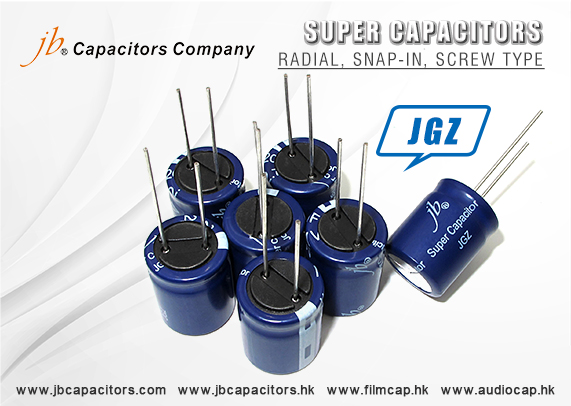
2020-4-23 16:57:42
views
Not long ago, we’ve launched a new series of JYA - Y1(CD 400VAC) and Y2(CE 300VAC) Safety Standard Recognized Capacitors. Class-Y capacitors are safety-certified. They also are designed and used in across the line applications. These safety capacitors are also known by other names, such as AC line filter safety capacitors and EMI/RFI suppression capacitors.
It can be used in many electronic device applications including Line disturbances suppression, Motors and motor controls, Relays, Switching power supplies, Inverters, Line-to-line (Class X) filtering, Line-to-ground (Class Y) filtering, Antenna coupling, Primary and secondary coupling, Network and security protection, audio visual product,, Home Appliance, new energy, Industry automation, LED.
Main Specifications:
| Operating Temperature | -25°C~ +85°C |
| Capacitance Range | 10pF TO 10000pF |
| Capacitance Tolerance | ±10%, ±20%, +80-20% |
| Rated Voltage | AC 125V, 250V, 300V, 400V |
| Temperature Coefficient | 2B(Y5P)±10%、2E(Y5U)+22%~-56%、2F(Y5V)+22%~-82% |
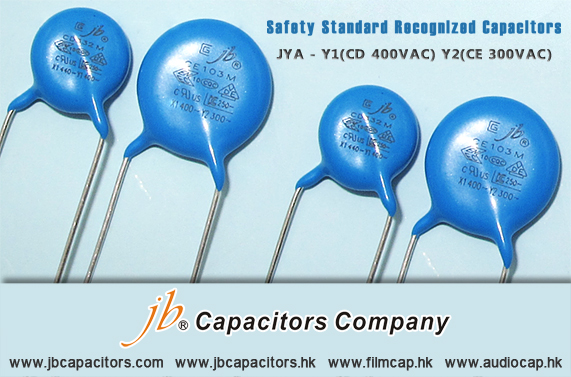
2019-7-11 14:11:12
views
Electrolytic VS Ceramic Capacitor
A capacitor is an electrical component which is able to store electrical charges. Capacitors are also known as condensers. Ceramic capacitors and electrolytic capacitors are two main types of capacitors that are widely used in electrical and electronic components. The ceramic capacitor uses a thin ceramic layer as the dielectric medium whereas the electrolytic capacitor uses an ionic liquid as one of the sheets of the capacitor. In this article, we are going to discuss what electrolytic capacitor and ceramic capacitor are, their properties, and finally a comparison between electrolytic capacitor and ceramic capacitor and summarize the difference between ceramic capacitors and electrolytic capacitors.
What is a Ceramic Capacitor?
In order to understand what a ceramic capacitor is one must first understand what a capacitor is in general. Capacitors are devices that are used to store charges. Capacitors are also known as condensers. Commercially used capacitors are made of two metal foils with a dielectric medium in between them rolled into a cylinder. The capacitance is the main property of a capacitor.
The capacitance of an object is a measurement of the amount of charges that object can hold without discharging. Capacitance is a very important property in both electronics and electromagnetism. Capacitance is also defined as the ability to store energy in an electric field. For a capacitor, which is having a V voltage difference across the nodes and the maximum amount of charges that can be stored in that system is Q, the capacitance of the system is Q/V, when all are measured in SI units. The unit of the capacitance is farad (F). However, as it is inconvenient to use such a large unit, most of the capacitance values are measured in nF, pF, µF and mF ranges.
In a ceramic capacitor, a thin ceramic layer act as the dielectric medium. A ceramic capacitor has no polarity. Ceramic capacitors are classified into three main classes. Class I capacitors have better accuracy and low volumetric efficiency whereas class III capacitors have low accuracy and high volumetric efficiency.
What is an Electrolytic Capacitor?
An electrolytic capacitor is made by having an ionic liquid as one of the conducting plates of the capacitor. Most of the electrolyte capacitors are polarized. This means the voltage at the anode cannot become negative relative to the voltage applied to the cathode. If this happens, the capacitor becomes corrupted by ion exchange. Electrolytic capacitors are famous for having higher volumetric efficiency. This means a small capacitor is able to hold larger amount of charges than a ceramic capacitor of the same size.
What is the difference between Ceramic Capacitor and Electrolytic Capacitor?
• Ceramic capacitor has two metal sheets at the terminals to store charges. The electrolytic capacitor has one metal sheet and an ionic liquid as the two terminals.
• Electrolytic capacitors are capable of holding more charges per volume than ceramic ones.
• Most of the electrolyte capacitors are polarized, but ceramic capacitors are never polarized
From jb Capacitors Company sales department
Learn more Imformation:http://www.jbcapacitors.com/
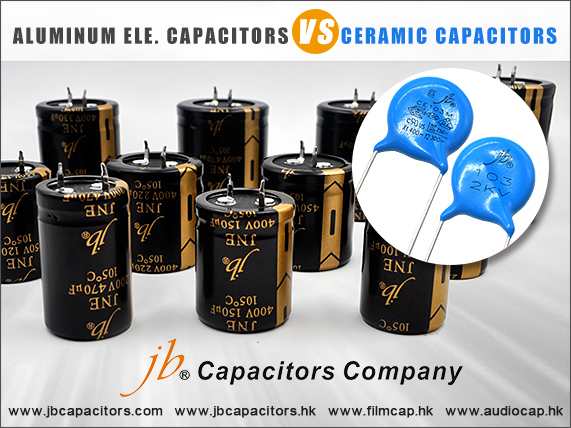
2019-7-5 10:36:32
views
Aluminum electrolytic capacitors consist of cathode aluminum foil, electrolytic paper, electrolyte and a layer of aluminum oxide, which acts as the dielectric, formed on anode foil surface and offers rectifying properties. When in contact with electrolyte, the oxide layer possesses an excellent forward direction insulation property. The higher the purity of the aluminum foil, the greater the dielectric strength of the aluminum electrolytic capacitor.
JCN SMD Aluminum Electrolytic Capacitors Bi-Polar/Non-Polar Electrolytic Capacitors General Purpose Electrolytic Capacitors are used for input/output smoothing circuit, excellent output filter, auxiliary power supplies circuit or phase compensation circuit. These aluminum electrolytic capacitors can be equipped with an anti-vibration base that improves anti-vibe resistance to 30G-40G.
JCN - 1000H at 85°C, Bi-polar SMD Aluminum Electrolytic Capacitor Download Datasheet View:
http://www.jbcapacitors.com/SMD-Aluminum-Electrolytic-Capacitors/JCN-1000H-at-85-Bi-polar-SMD-Aluminum-Electrolytic-Capacitor.html

2019-5-21 15:3:17
views
We launched a product called JLX - Luxury Aluminum Foil and Film Metallized Polypropylene Capacitors – Axial last year. It is a cost-effective way to buy from us. And, we have reliable QC depart
We launched a product called JLX - Luxury Aluminum Foil and Film Metallized Polypropylene Capacitors – Axial last year. It is a cost-effective way to buy from us. And, we have reliable QC department to provide the high-quality capacitors to customers. More importantly, we are the only supplier in China.
We have confident that we have great advantages comparing to other brands not only price but also quality. Please do contact us for more information, I am sure you will not be disappointed.
Important feature:
Capacitance Range:1 to 10uF
Voltage: 100V, 200V. DC
Capacitance Tolerance: ±3%(E) 1KHz
Dissipation Factor : ≤0.0002 1KH
